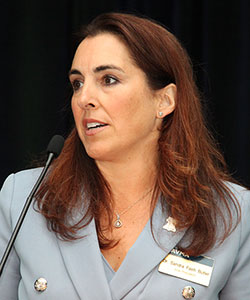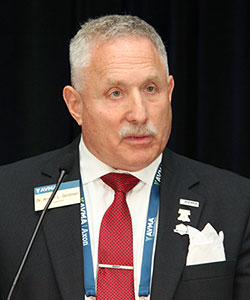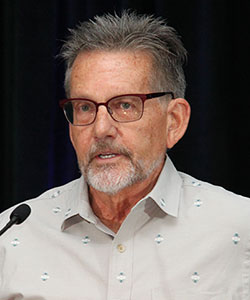
Three candidates declare for AVMA’s top spot
The race for 2023-24 AVMA president-elect will have plenty of competition as three individuals have announced their candidacy for the position—the first time in recent memory.
Dr. Sandra Faeh Butler, 2020-22 AVMA vice president; Dr. Arnold L. Goldman, 2017-23 AVMA treasurer; and Dr. Robert Murtaugh, a former chair of the AVMA American Board of Veterinary Specialties, launched their campaigns July 29 during the regular annual session of the AVMA House of Delegates in Philadelphia, which took place in conjunction with AVMA Convention 2022.
Using the right tools

Dr. Faeh, of River Forest, Illinois, serves as National Veterinary Associates’ first mentor in its Clinical Mentorship Program and is helping to develop this national program.
She is a 1996 veterinary graduate of the University of Illinois, previously serving as president of the Student AVMA. Dr. Faeh has also served as president of the Illinois State VMA and Chicago VMA.
She represented Illinois as an alternate delegate and delegate to the AVMA HOD from 2012-20, including a term as chair of the AVMA House Advisory Committee. She served two separate terms on the AVMA Veterinary Leadership Conference Planning Committee: first as an emerging leader from 2000-05 and later as its HOD representative.
She formerly was part owner of four small animal hospitals in the Chicago suburbs before selling to NVA.
Dr. Faeh said in her remarks that in every part of their lives, people rely on different tools and resources to perform their jobs and function to the best of their abilities with whatever tasks or project they are tackling. Her goal is always to help others use their tools to ensure as smooth a process as possible and help simplify complex situations.
“For me, the definition of a true leader is not to show up with a list of things they want to accomplish, to not show up with an agenda,” Dr. Faeh said. “A leader is someone who identifies problems or challenges and uses the tools that are available. If elected, I will listen, and I will guide, and together we will be the avenue to solutions.”
Core principles

Dr. Goldman, of Canton, Connecticut, has owned and operated Canton Animal Hospital since 1995. Prior to then, he worked in general practices and subsequently spent four years in emergency and critical care practice. He also worked as a relief veterinarian throughout New England, New York, and New Jersey.
He is a 1986 veterinary graduate of the University of Florida and earned a master’s in public health in 2011 from the University of Minnesota.
Dr. Goldman has been active in organized veterinary medicine for more than two decades, having served terms on the boards and as president of the Hartford County VMA, Connecticut VMA, and New England VMA. He is founder and past president of the Connecticut Veterinary Medical Foundation and created its Connecticut State Animal Response Team program.
He has served as Connecticut delegate and alternate delegate to the AVMA HOD from 2011-17 and on the AVMA's State Advocacy and Governance Performance Review committees.
Dr. Goldman said in his speech before the HOD that in the course of his service on AVMA committees, in the House, and on the AVMA Board of Directors as treasurer, certain themes repeatedly surfaced that embody the unique essence of the veterinary profession: unity, professionalism, and service.
“As your president-elect and president, I will tirelessly promote these values as the basis of who we are,” he said. “Unity among us is essential for success in preserving our profession’s vital standing throughout society.
“We must also strive to preserve our public image as professionals. Doing so requires cultivation and reinforcing the characteristics of professionalism, competence, conscientiousness, honesty, respect for clients and colleagues, and emotional intelligence. …
“Finally, we deeply value our reputation for caring and our acknowledgment of our duty of service. It’s what makes our profession unique, revered by the public, and is the essence of the Veterinarian’s Oath.”
Challenges and solutions

Dr. Murtaugh, of Wimberley, Texas, joined Pathway Vet Alliance, now Thrive Pet Healthcare, in 2015 as partner and chief medical officer. He is currently chief professional relations officer.
A 1980 veterinary graduate of the University of Minnesota, he also has a master’s in veterinary science from The Ohio State University.
Dr. Murtaugh joined the veterinary faculty from 1984-98 at what is now known as Cummings School of Veterinary Medicine at Tufts University.
He was chief of staff for two years at the nonprofit DoveLewis Emergency Animal Hospital in Portland, Oregon, before he joined VCA Animal Hospital in 2000.
Dr. Murtaugh is a diplomate of both the American College of Veterinary Internal Medicine and the American College of Veterinary Emergency & Critical Care. He has served as president of ACVECC and the Veterinary Emergency and Critical Care Society.
He said in his remarks to the HOD that the challenges to the profession are many and that its landscape has changed significantly in the past few decades since he first became a veterinarian.
“Technology advances, the human-animal bond catching fire, agribusiness evolving, the gender shift in our profession, and the exponential explosion of new knowledge, to name a few. We need to change the paradigm on delivery and access to care for all of our constituents,” Dr. Murtaugh said. “Our AVMA needs to be the lead on access-to-care solutions as it has been on other pressing issues, such as well-being, student debt, and diversity and inclusion.”
He cited potential solutions as telemedicine, exploring and increasing greater utilization of foreign-trained veterinarians, increasing enrollment of veterinary students and veterinary technician students in educational programs, introducing a midlevel practitioner, and “eliminating the rigidity that has crept into the training of specialists.”
A version of this article appears in the September 2022 print issue of JAVMA.